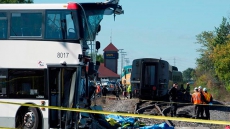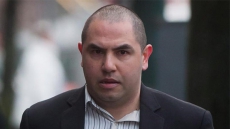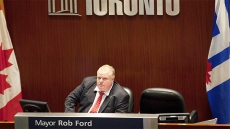VICTORIA - Whale research in British Columbia has come a long way from the days when the Department of Fisheries and Oceans mounted a 50-calibre machine gun at Seymour Narrows north of Campbell River with the aim of shooting Killer whales to save more salmon for anglers.
That was back in 1960, but attitudes and practices towards marine mammals, especially whales, have changed greatly, said marine mammal scientist John Ford.
"They set the machine gun up. They went out there with the intent to do so," he said. "But the whales didn't show up that summer, so it was abandoned."
"It's hard to imagine, machine-gunning them," Ford said. "But there were concerns from the fishing lodges in Campbell River these things were eating all their fish and taking them off the lines."
In the decade following the aborted machine-gun slaughter of killer whales, 68 were captured and placed in theme parks and aquariums, he said.
"Today, of course, they are iconic," Ford said. "We're doing all we can to save these populations. That shift in attitudes, it's so fundamental."
Other whale species were hunted to near extinction, sea otters were wiped out and seals and sea lions were fair game to bounty hunters.
"We had a bounty on harbour seals right up to 1970 — $5 a nose," he said.
Ford, who heads the Fisheries and Oceans Cetacean Research Program at Pacific Biological Station in Nanaimo, has authored a book examining B.C.'s rich and stunning variety of mammals that live in coastal waters.
He said he was approached by the Royal B.C. Museum in the late 1990s to write the handbook, called "Marine Mammals of British Columbia," and it's taken him more than 15 years to get the job done.
Ford's is the final volume in a series of six handbooks revising the museum's original 1965 handbook, "The Mammals of British Columbia."
The other volumes are: "Bats of British Columbia," "Opposums, Shrews and Moles of British Columbia," "Hoofed Mammals of British Columbia," "Rodents and Lagomorphs of British Columbia" and "Carnivores of British Columbia."
Ford said the 15 years it took to complete the book were actually a blessing because that gave scientists more time to study the marine mammals, especially various whale species that were near extinction and now are showing signs of rebounding.
"It's a kind of a combination handbook, field guide and reference book," he said. "I'm hoping it's useful."
Ford said the B.C.'s last whaling station closed in 1967 at Coal Harbour off northern Vancouver Island, and since then there have been some signs of population increases but other whale species continue to struggle to survive.
"A lot of the big whales were hunted to serious depletion along the West Coast here," he said.
The blue, humpback, fin and sei whales were all hunted off B.C. waters, and only the humpback has shown signs of making a big recovery.
In the last decade, there have been 20 confirmed sightings of blue whales in B.C. waters, Ford said. Sightings of the north pacific right whale, hunted to near extinction for the huge baleen plates on its mouth, which were used for spring steel, are extremely rare.
Two were spotted in 2013, one off Haida Gwaii in northern B.C., and the other off Port Renfrew on the West Coast of Vancouver Island.
"It was 61 years without sightings of that species," Ford said. "They are super rare."
He said the latest estimates from United Sates researchers suggest that less than 50 of the right whales exist.
Ford said the B.C. sightings were particularly uplifting because they were confirmed as not being among others identified by the Americans.
"It was exciting," said Ford, who saw both right whales. "I never thought I'd live to see the day because they are so rare. I was fortunate to see both of them. It was an amazing thing to behold. It's the rarest whale population in the world now."
He said the health of B.C.'s whale populations is a sign of the overall health of the oceans, but that many whale species are struggling.
"If we want to save the killer whales out there, the orcas, we need to make sure the marine ecosystem is intact, that there's enough Chinook salmon for them, that there's enough prey for the whales, small herring and so on for the chinook salmon," Ford said.
"If the whales are doing well you can be more than confident things are functioning in the marine ecosystem."
There are 31 marine mammal species in B.C., Ford said. "That's one quarter of all the marine mammal species known in the world."






